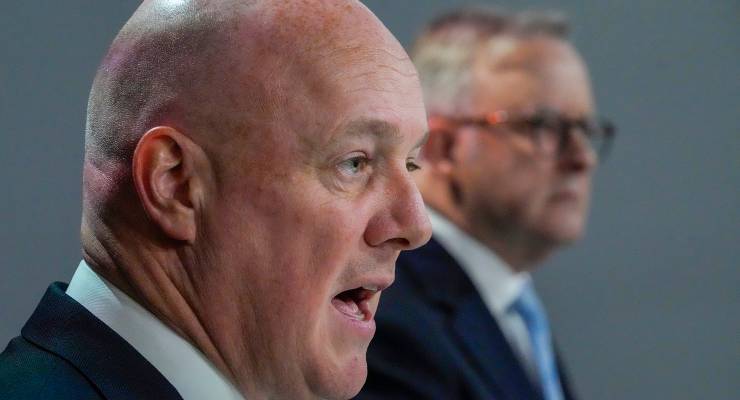
New Zealand’s interest in joining the AUKUS technology sharing partnership could become a divisive issue for the country’s new conservative government, but would be helpful in achieving “balance” in its relationship with China, analysts say.
Prime Minister Christopher Luxon told reporters on Wednesday his government was “interested in exploring pillar two in AUKUS”, particularly with regard to new technologies and the opportunities that may result for New Zealand.
“We’ll work our way through that over the course of next year as we understand it more and think about what the opportunities may be for us,” Luxon said during a visit to Sydney, speaking at a joint press conference with Australian Prime Minister Anthony Albanese.
Luxon, who represents New Zealand’s centre-right National Party, described AUKUS as “a very important element in ensuring we’ve got stability and peace from the region” but said New Zealand’s nuclear-free position was “non-negotiable”.
AUKUS pillar one is the plan for Australia to acquire nuclear-powered submarines, whereas pillar two is the planned sharing of sensitive military technologies between partners in the US-UK-Australia defence pact.
University of Canterbury associate professor of political science Jeremy Moses said Luxon’s comments were in line with the position adopted by the previous Labour Party government.
“I think there is likely to be more willingness across the new government for this, however, and we will likely see a more general move toward closer alignment with Australian and US military and defence policy,” Moses told Crikey.
He added it was possible the approach could become divisive in New Zealand, a country with a long-standing opposition to nuclear-powered ships and nuclear arms.
“The anti-nuclear movement remains strong in New Zealand and campaigners will likely put up a strong challenge if the government moves to joining AUKUS, even if they say it’s only under pillar two. That has the possibility of becoming a very divisive issue, alongside many others that are emerging in the early days of this new government,” he said.
University of Otago associate politics professor Nicholas Khoo said joining pillar two would help achieve “balance” in New Zealand’s relationship with China.
“Specifically, major improvements in New Zealand’s relationship with China, such as the upgrading of the New Zealand-China free trade agreement in April 2022, must be balanced by corresponding improvements in our relationship with Australia, the US, and long-standing partners such as the UK,” he told Crikey.
“Critically, such an approach strengthens New Zealand’s independent foreign policy by providing us with foreign policy options and capabilities.
“Conversely, a foreign policy that is overly focused on improving relations with China, and does not invest sufficiently in New Zealand’s relationship with Australia, the US, and the UK lacks a robust balance, and is the opposite of the spirit and substance of an independent foreign policy.”
University of Waikato law professor Alexander Gillespie questioned whether New Zealand joining pillar two would mean the country would be expected to be involved in any future American conflicts.
“Linking to the next generation of military technology, with full interoperability with Australia makes excellent sense. The risk is how this relates to broader defence arrangements,” he told Crikey.
“In a nutshell, while New Zealand is fully committed to defending Australia, it is less clear that we would want to be involved in any American-related conflict. This is not saying ‘no’, just the need to be clear about the political relationships involved.”
New Zealand government briefing documents obtained by Auckland University of Technology lecturer Marco de Jong indicate officials there view pillar two as an opportunity for New Zealand’s research and industry spheres.
“New Zealand has confirmed with the AUKUS partners (and publicly) that we are interested in exploring what AUKUS pillar two might offer or mean for us, on a no-commitments basis,” a September 2023 briefing note to ministers said.








Just goes to show how conservative the Albanese regime is when the rightest-wingest NZ government for decades wants a slice of the AUKUS action. Where can we migrate to now New Zealand has gone to the dogs?
ooh, ooh, yes please – we want to transfer billions over to our overlords in the US, too! – can we, can we, can we? – please say yes!
what a pillock!
What would it mean? It would likely mean New Zealand becomes the 52nd state of the USA, Australia now being the 51st (with no thanks to Morrison, Albanese/Marles).
And we’ve paid some $380+ billion to become the vassal state and nuclear waste dumping ground. Way to go, Orstraya!
Don’t be negative, the pollies get a photo opp with the pres at the Whitehouse (in Washington, not the magazine).